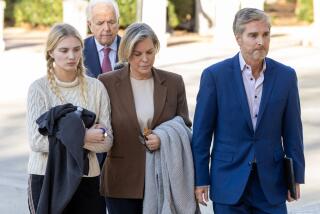Jury clears Toyota in wrongful-death lawsuit
A Los Angeles County jury handed Toyota Motor Corp. a significant legal victory Thursday, clearing it of responsibility in a 2009 crash of a Camry that accelerated out of control, killing the driver.
But in a surprising twist, the jury also handed down a $10-million verdict against a codefendant who was driving a second vehicle that broadsided the sedan, setting the gruesome accident in motion.
After six days of deliberation, jurors rejected the theory that Toyota had a hand in the death of Noriko Uno. She was killed in Upland after her Camry suddenly accelerated, hitting a telephone pole and a tree, nearly cutting the vehicle in half.
Lawyers for Uno’s family had argued that because the vehicle lacked a safety system called a brake override, Toyota was partially to blame. Instead, the jury found that the accident was entirely the fault of the other driver, Olga Belo, who crashed into the Camry, causing Uno to accidentally step down on the accelerator and race out of control.
“We are gratified that the jury concluded the design of the 2006 Camry did not contribute to this unfortunate accident,” Toyota said in a statement. “We believe this verdict sets a significant benchmark by helping further confirm that Toyota vehicles are safe with or without brake override.”
The Uno case was the first of a group of “bellwether” cases, selected by a Superior Court judge, to go to trial. It’s unclear whether it will set the tone for future trials because few, if any, of the other plaintiffs plan to focus on the brake override system.
A lawyer for Belo could not immediately be reached for comment.
Garo Mardirossian, attorney for Uno’s surviving family members, said he was gratified with the verdict, which he characterized as a “win, win, win.” Uno, who suffered from diabetes and owned a sushi restaurant, is survived by her husband and son.
“To get a $10-million verdict for a 66-year old woman with medical problems is a great thing,” he said, adding that he believed the case also opened avenues for other plaintiffs to go after Toyota in future lawsuits. “Toyota got a lot of chinks in its armor exposed here.”
Toyota still faces scores of lawsuits over unintended acceleration, most of which contend that the automaker’s vehicles contain electronic defects.
One such case got underway earlier this week in state court in Oklahoma. It involves Jean Bookout, a woman whose Camry accelerated out of control and struck a wall, killing the passenger.
Next month in federal court in Santa Ana, lawyers for the family of Ida Starr St. John will also allege that faulty electronics caused her Camry to accelerate wildly and smash into a school in Georgia. St. John survived the crash but died before the case could go to trial.
Numerous outside experts have claimed that sudden acceleration could be caused by an electronic defect in Toyota vehicles, although to date no evidence has been presented that conclusively proves that theory.
Toyota, for its part, has vigorously denied those charges. It points to studies conducted by the National Aeronautics and Space Administration and the National Academy of Sciences that failed to find any bug.
During the nine-week Uno trial, attorney Mardirossian built a theory that the collision with the Lexus driven by Belo caused the heel of Uno’s foot to become wedged on the gas pedal.
He said she tried to stop the car by depressing the brake with her left foot, but the car zoomed ahead, taking Uno on a harrowing 2,600-foot drive against traffic, ending in a horrific crash.
A brake override, he said, would have saved her. That fail-safe deactivates a car’s accelerator if the brake is depressed. It was adopted by many automakers in the early 2000s, but Toyota didn’t begin using it until 2010.
Toyota’s lead attorney, Vincent Galvin Jr., countered that a brake override would not have saved Uno because she mistook the accelerator for the brake. What’s more, he argued that brake override was not required under federal vehicle safety standards.
“The brakes would have stopped the car in this accident if Mrs. Uno would have used them,” Galvin said during the trial.
Toyota’s sudden acceleration problems first came to national attention following the August 2009 death of an off-duty California Highway Patrolman and his family in a runaway Lexus ES outside San Diego.
The accident, which was recorded on a chilling 911 call, drew national attention. It led to a series of huge and costly recalls for Toyota, as well as congressional hearings and more than $65 million in federal fines for the automaker.
Toyota has been named in hundreds of lawsuits alleging sudden acceleration since the issue emerged. Until now, only one, in New York, had reached a jury. Toyota was absolved in that case as well.
But Toyota has settled a significant number of cases out of court including a $10-million deal in 2010 with the family of the California trooper. Late last year, it agreed to pay $1.6 billion to settle a class-action case brought by thousands of Toyota owners contending that the sudden acceleration damaged the value of their vehicles.
Attorney Aaron Jacoby, an expert on auto product liability, said that regardless of the arguments made in future cases, Thursday’s verdict will help Toyota.
“Could the cases turn the other way going forward? Of course,” Jacoby said. “But Toyota certainly feels the wind at its back going forward.”







